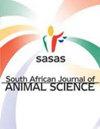低、高能日粮育肥期恩古尼和邦斯马拉公牛背最长肌基因表达差异
IF 0.6
4区 农林科学
Q3 AGRICULTURE, DAIRY & ANIMAL SCIENCE
引用次数: 0
摘要
本研究的目的是研究饲喂不同能量密度日粮的恩古尼牛和邦斯马拉牛的差异基因表达谱。最终目标是提高对这些品种之间差异的机制的理解,以及品种之间差异与营养环境的潜在相互作用。试验采用2 × 2因子设计(12.5 MJ/kg DM vs. 10.9 MJ/kg DM)。初始试验每处理10头公牛犊牛。然而,由于资金限制,每次治疗只能对6只动物进行RNA测序,而且从一只动物身上产生的RNA质量不足,无法发挥作用。错误发现率p值为2.0的转录本被认为是显著的。与恩古尼相比,邦斯马拉的生长率更快,活重和胴体重更重,饲料转化率更高。然而,恩古尼人的脂肪含量较低。20个不同基因的差异表达,其中3个表现出互作效应,所有20个基因的转录丰度在不同品种之间存在差异。饮食的影响只观察到一个基因,该基因也受到相互作用的品种效应。观察到的影响线粒体结构或功能的几个基因在邦斯马拉和恩古尼之间的基因表达差异暗示了品种之间能量代谢的差异。相互作用对某些基因转录物丰度的影响表明,在评估品种差异时需要考虑饮食,反之,在评估饮食时也要考虑品种。本文章由计算机程序翻译,如有差异,请以英文原文为准。
Differential gene expression in the Longissimus dorsi of Nguni and Bonsmara bulls finished on low and high energy diets
Objectives of this research were to examine differential gene expression profiles of Nguni and Bonsmara cattle fed diets differing in their energy density. The ultimate goal was to improve understanding of the mechanisms that underlie differences between these breeds and the potential interactions of the differences between breeds with the nutritive environment. The experiment was designed as a 2 × 2 factorial arrangement of breed and diet (12.5 MJ/kg DM vs. 10.9 MJ/kg DM). The initial feeding trial had 10 bull calves per treatment. However, financial constraints limited RNA sequencing to six animals per treatment and the RNA generated from one animal was of insufficient quality to be useful. Transcripts with false discovery rate P-values <0.05 and fold-changes >2.0 were considered significant. Bonsmara had a faster growth rate, heavier live and carcass weights, and better feed conversion compared to Nguni. However, lower levels of fat were observed in Nguni. Twenty different genes were differentially expressed, with three exhibiting interaction effects and all 20 having differences in transcript abundance between the breeds. A dietary effect was only observed for the one gene and that gene was also subject to an interaction effect with breed. Observed differences in gene expression between Bonsmara and Nguni by several genes affecting the structure or function of the mitochondria imply differences in energy metabolism between the breeds. Interaction effects on the abundance of some gene transcripts indicate the need to consider the diet when evaluating breed differences and conversely, consider breed when evaluating diets.
求助全文
通过发布文献求助,成功后即可免费获取论文全文。
去求助
来源期刊

South African Journal of Animal Science
农林科学-奶制品与动物科学
CiteScore
1.50
自引率
0.00%
发文量
39
审稿时长
>36 weeks
期刊介绍:
The South African Journal of Animal Science is an open access, peer-reviewed journal for
publication of original scientific articles and reviews in the field of animal science. The journal
publishes reports of research dealing with production of farmed animal species (cattle, sheep,
goats, pigs, horses, poultry and ostriches), as well as pertinent aspects of research on aquatic
and wildlife species. Disciplines covered nutrition, genetics, physiology, and production
systems. Systematic research on animal products, behaviour, and welfare are also invited.
Rigorous testing of well-specified hypotheses is expected.
 求助内容:
求助内容: 应助结果提醒方式:
应助结果提醒方式:


